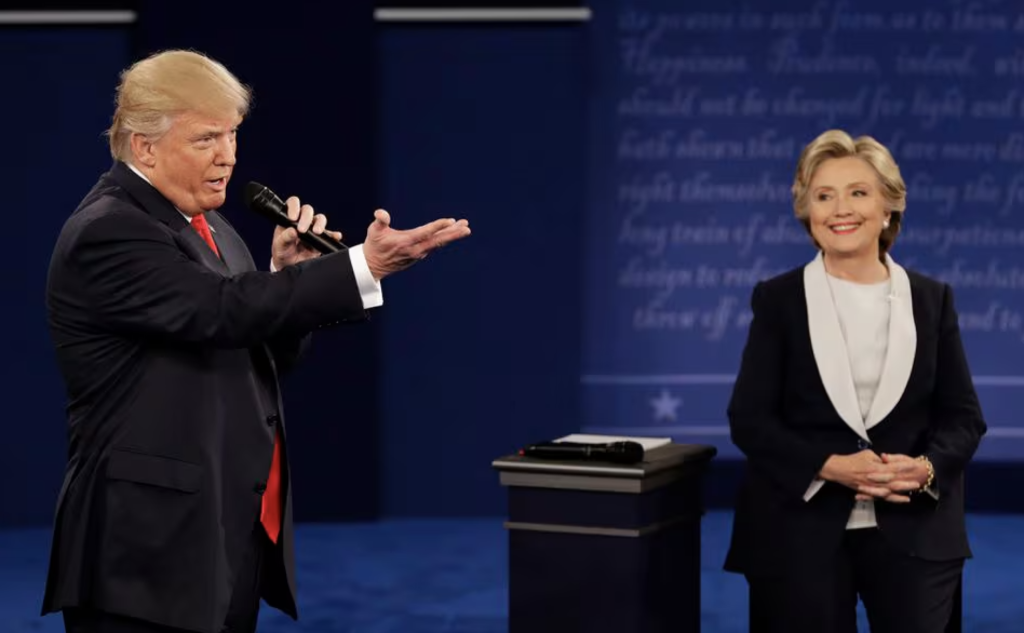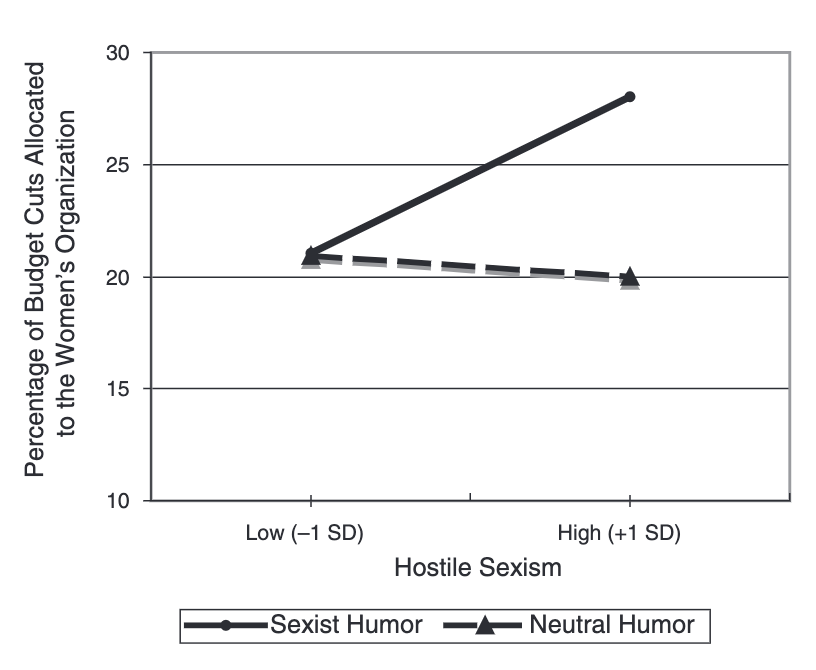Dark comedy has allowed misogyny to stay mainstream (Ford et al. 2007: 168). It’s easy to find recent examples of jokes that went too far. For example, in 2016, a leaked tape of former President Donald Trump joking with a male friend about sexually harassing and “grabbing [women] by the pussy” went viral. Trump dismissed these comments as private “locker room banter,” and was elected President one month later (Fahrenthold: 2016).

More recently, comedian Matt Rife opened his Netflix special, which he marketed to a male audience, with a joke about domestic violence: “If she could cook,” he joked, “she wouldn’t have that black eye”. This joke relies upon a stereotype about women’s household roles and blames a victim of violence for her own bruises.
The swift public reaction to Rife’s words exemplifies what Ivo Neiuwenhuis and Dick Zijp call an “age of comic controversy,” in which the line between what is funny and what is offensive seems blurred (2022: 341). Linda Mizejewski, a women’s studies professor at Ohio State, argues that Rife’s joke was a “stupid move” that “raises questions about what Rife feels is necessary to connect to male audiences” (Hall 2023).
Meanwhile, comedian Josh Wolf came to Rife’s defense, saying that those who felt offended were being too uptight: “that joke is not making anyone go home and hit their wife” (Wolf 2023).
The Benefits of Dark Comedy
Comedy is an extremely meaningful aspect of the human social experience: when we joke with others, we establish bonds, share our beliefs, and cultivate our presentations of self. (Zijderveld 1968: 287). Even dark comedy, a form of humor in which actors make light of taboo or serious subjects, has its merits. For example, research has shown that dark humor is a vital tool for emergency workers, helping them to cope with stressful situations and support one another (Roe & Regehr 2010: 448).
Crossing a Line
Yet “locker room talk,” a colloquial term for male-dominated dark humor, is often rooted in misogynistic attitudes and can become dangerous. Though not always taken seriously, studies show that sexist comedy normalizes and provokes prejudiced action in real-world situations. In one study, male participants were asked to complete a hypothetical budgeting exercise after watching a series of comedy skits. Those who were exposed to sexist humor cut significantly more of a women’s organization’s budget than those who watched other skits (Ford et al. 2007: 163)*. Another study indicated that young men became more inclined towards sexual aggression and rape after reading sexist jokes (Romero-Sánchez et al. 2019). Regardless of context or intent, locker room humor has the power to transmit problematic views into the minds of young men.

Sociologists note that while our society has become “increasingly intolerant of open expressions of bias,” prejudice lives on through disparaging humor. Though most people have begun to reject plainly misogynistic stereotypes, jokes relying on the same attitudes, such as Rife’s joke discussed above, rarely attract the same level of criticism. Instead, such comments are passed off as harmless because they’re “just jokes,” and because “boys will be boys” (Hodson & MacInnis 2016: 69-70).
Looking Forward
Humor can and should be playful and outrageous, but it’s possible to joke about sensitive topics without putting anyone down. Men, as the target audiences of misogynistic humor, have a special responsibility to understand its troubling implications.

Although Trump and Rife’s words exemplify the problematic nature of locker room humor, in the right circumstances, dark comedy can be a valuable tool for combating prejudice (Hodson & MacInnis 2016: 72). Consider Sasha Baron Cohen’s Borat or Michael Scott from “The Office”. Both characters are extremely offensive and out-of-touch, but the humor lies in the ridiculousness of their bigotry. To audiences, Michael and Borat are the targets of their own jokes, rather than those they disparage. Comedy helps us relate to others, so when we joke about gender, we should seek to bond by ridiculing misogyny, rather than participating in it.
References
Fahrenthold, David A. 2016. “Trump Recorded Having Extremely Lewd Conversation about Women in 2005.” The Washington Post.
Ford, Thomas E., Christie F. Boxer, Jacob Armstrong, and Jessica R. Edel. 2007. “More than ‘Just a Joke’: The Prejudice-Releasing Function of Sexist Humor.” Personality and Social Psychology Bulletin 34(2):159–70.
Hall, Jackson. 2023. “Matt Rife Ignites Conversations about Comedy and Cancel Culture Following Netflix Special.” The Lantern.
Hodson, Gordon and Cara C. MacInnis. 2016. “Derogating Humor as a Delegitimization Strategy in Intergroup Contexts.” Translational Issues in Psychological Science 2(1):63–74.
Nieuwenhuis, Ivo and Dick Zijp. 2022. “The Politics and Aesthetics of Humour in an Age of Comic Controversy.” European Journal of Cultural Studies 25(2):341–54.
Romero-Sánchez, Mónica, Jesús L. Megías, and Hugo Carretero-Dios. 2019. “Sexist Humor and Sexual Aggression against Women: When Sexist Men Act According to Their Own Values or Social Pressures.” Journal of Interpersonal Violence 36(21–22).
Rowe, Alison and Cheryl Regehr. 2010. “Whatever Gets You through Today: An Examination of Cynical Humor among Emergency Service Professionals.” Journal of Loss and Trauma 15(5):448–64.
Wolf, Josh. 2023. “Josh Wolf Reacts to Matt Rife Controversy.” YouTube. (https://www.youtube.com/watch?v=dBUT8hJyrqs).
Zijderveld, Anton. 1968. “Jokes and their Relation to Social Reality.” Social Research 35(2):286-311.
Images and Video Clips
Griffin, Erik, dir. 2023. “Matt Rife: Natural Selection.” Avesta Entertainment. Netflix.
I’m Not Norm. 2019. “Sexist Jokes Compilation.” YouTube. (https://www.youtube.com/watch?v=6GFIV4T-Z_Q&t=3s).
Locher, John. 2016. “Republican Presidential Nominee Donald Trump.” Associated Press.
Simons, George. 2020. “Joining the Locker Room Talk.” The Good Men Project.